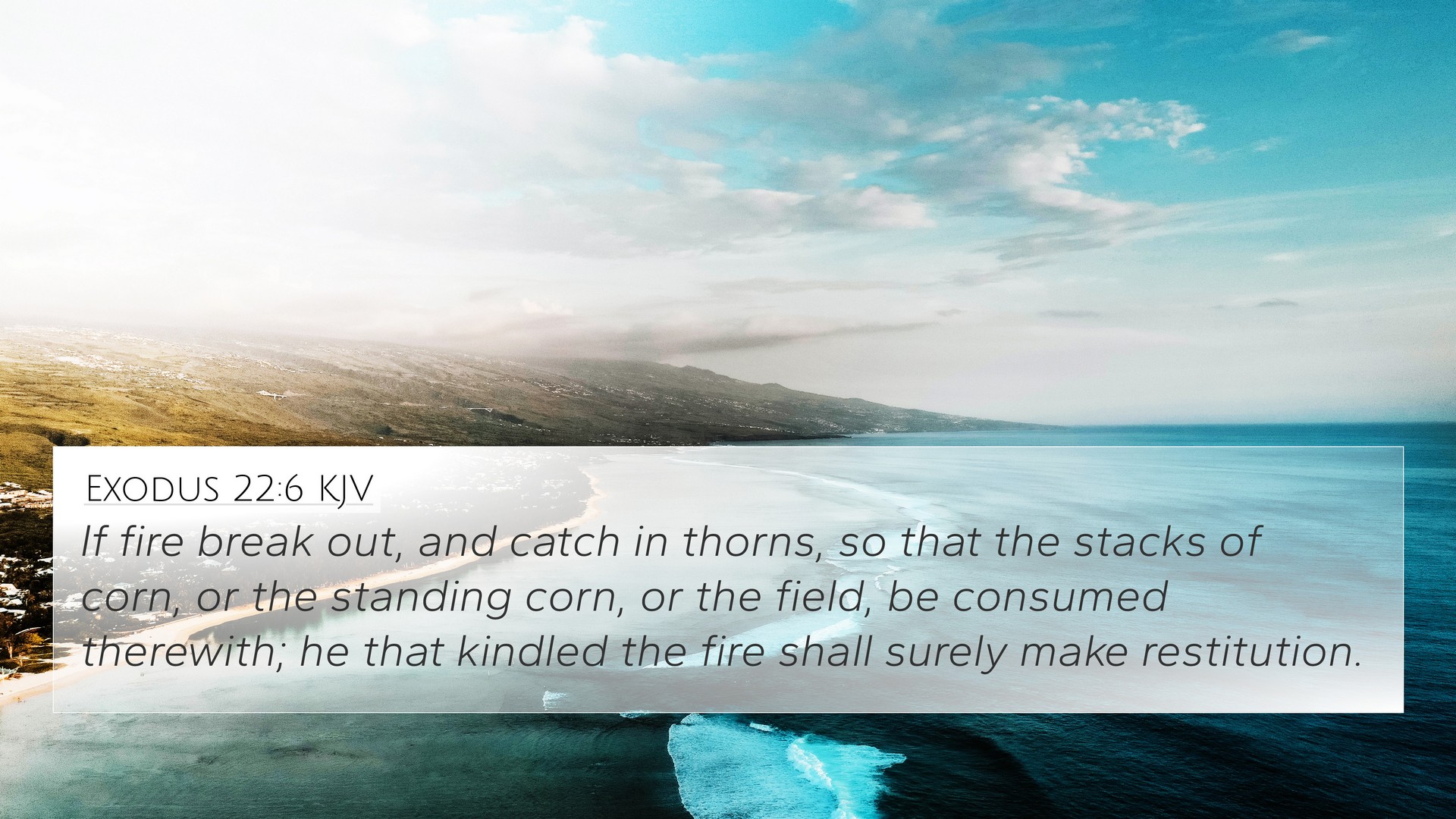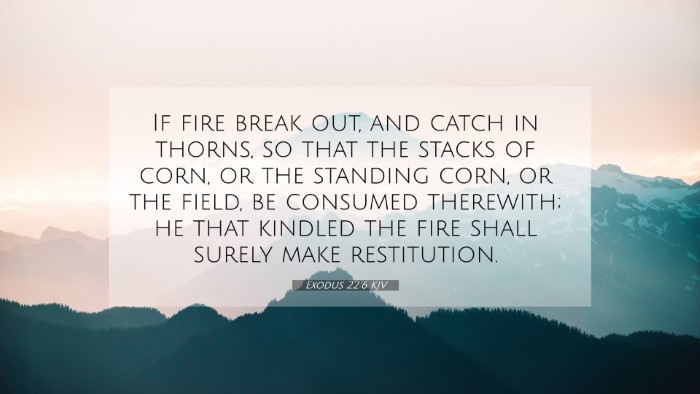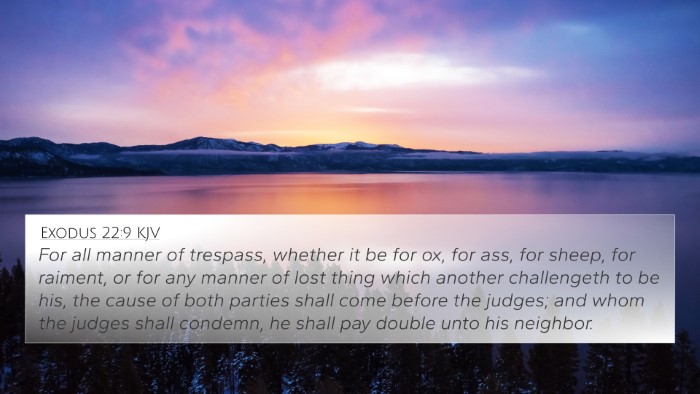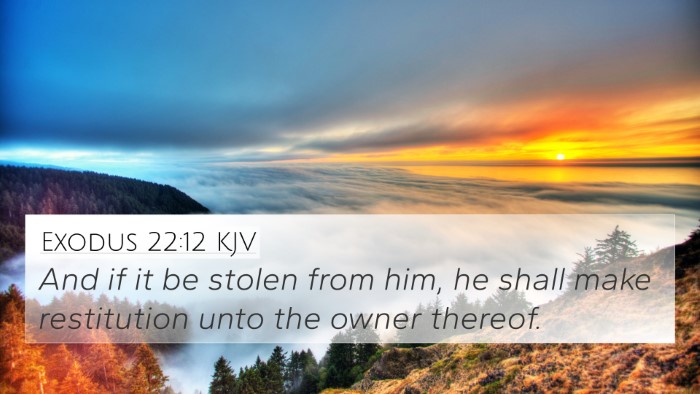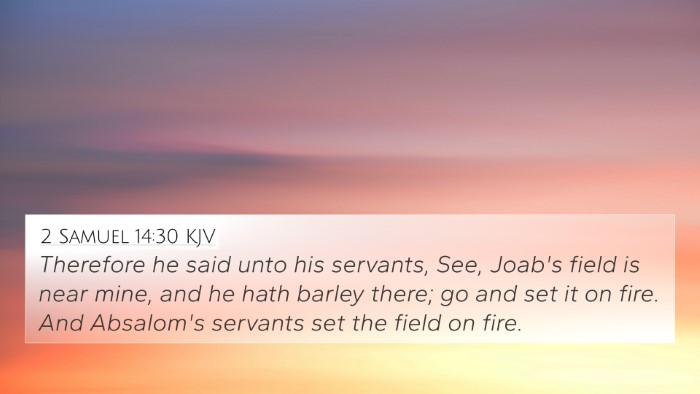Understanding Exodus 22:6
Exodus 22:6 states, "If fire breaks out and spreads to thorns so that the stacked grain or the standing grain or the field is consumed, he who started the fire shall make full restitution." This verse underscores the significance of personal responsibility and accountability for one’s actions, particularly in the realm of property and community relationships.
In the context of ancient Israelite society, this verse illustrates the legal principles that govern personal conduct and the implications of negligence. Commentators like Matthew Henry, Albert Barnes, and Adam Clarke have provided rich insights into this scripture, emphasizing its moral and practical applications.
Key Insights from Commentaries
-
Matthew Henry interprets this verse as a reminder of the importance of taking proper care with one's possessions. He emphasizes that negligence can lead to loss not just for the individual, but for the community as well. This highlights the interconnectedness of society, where one person's actions may impact many.
-
Albert Barnes stresses the concept of restitution, suggesting that this law reflects God's justice. It holds individuals accountable for their actions, reinforcing the moral obligation to ensure the safety of others' property. Barnes notes that the principle of making good on one's mistakes is rooted in fairness and community well-being.
-
Adam Clarke expands on the notion of causing harm through carelessness. He argues that this law serves not only as a deterrent against negligence but also as a foundational guideline for maintaining order within the community. The importance of restitution reinforces the moral fabric that binds society together.
Bible Cross-References
Exodus 22:6 relates closely to various other scripture passages that offer deeper understanding and reinforce the principles of accountability and restitution. These include:
- Leviticus 6:4-5: Discusses the necessity of restitution in cases of theft or injury.
- Proverbs 6:30-31: Talks about the circumstances under which a thief must restore what was taken, illustrating the importance of integrity.
- Luke 19:8: Where Zacchaeus, the tax collector, pledges to restore fourfold what he has wrongfully taken, reflecting a New Testament understanding of restitution.
- Matthew 5:23-24: Encourages reconciliation before making offerings, linking personal accountability to religious observance.
- Romans 13:10: Emphasizes that love should fulfill the law, root principles of which include respect for others' rights and properties.
- 1 Corinthians 6:1-5: Discusses disputes among believers and the call to resolve them justly rather than before secular courts.
- Galatians 6:5: Encourages individuals to bear their own burdens, reflecting personal responsibility in actions that affect the community.
Thematic Connections and Insights
Thematically, Exodus 22:6 speaks to broader issues of responsibility and community ethics found throughout the Bible:
-
Community Restoration: The theme of restoring what is lost or damaged ties into larger biblical narratives about redemption and community health.
-
Divine Justice: The accountability emphasized in this verse mirrors the justice of God that permeates both the Old and New Testaments.
-
Human Relationships: It points to the necessity of maintaining harmony in relationships, specifically through care and accountability.
-
Practical Wisdom: The wisdom literature often echoes these sentiments, teaching that our actions have consequences that can affect others significantly.
Practical Application
For modern readers, Exodus 22:6 and its interpretations provide valuable lessons on personal responsibility. It challenges individuals to consider how their actions impact others and emphasizes the ethical obligation to make things right when we cause harm. Whether it is in our personal, professional, or community lives, the principles gleaned from this verse remain relevant.
Conclusion
In summary, Exodus 22:6 serves as a critical reminder of the importance of accountability and communal welfare. Through the insights of respected commentators and the connections made with numerous biblical texts, we recognize the enduring truth that our actions have lasting impacts on those around us. By engaging with these scriptures, we not only deepen our understanding but also enrich our ethical framework as we navigate our daily lives.
